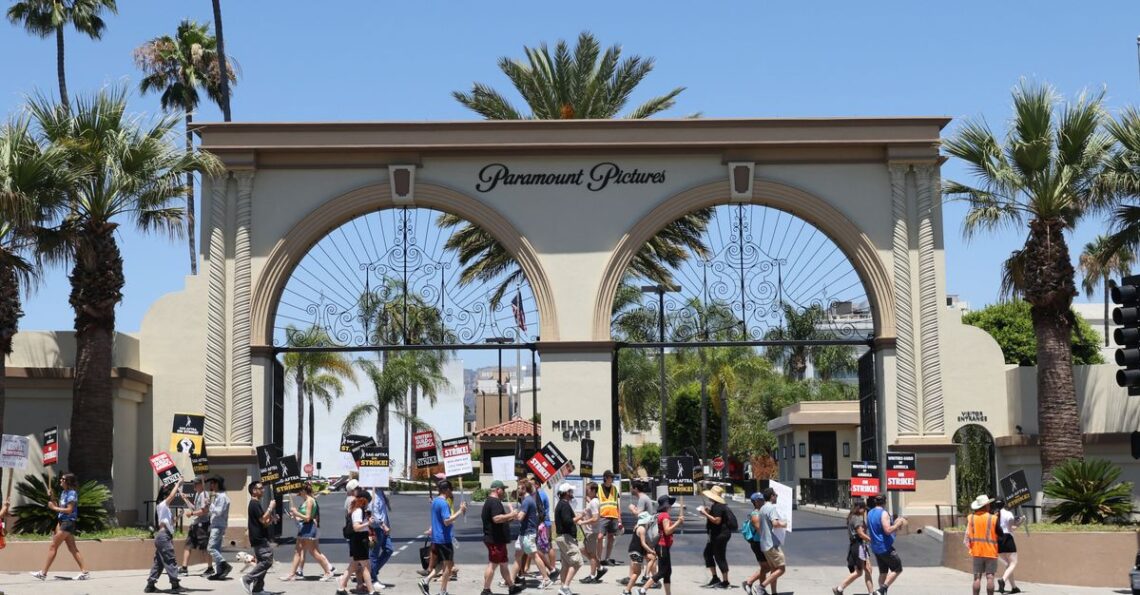LOS ANGELES (Reuters) -As the Hollywood writers’ strike approaches the 100-day mark, Writers Guild of America (WGA) negotiators met on Friday with representatives of the major studios for the first time in three months to discuss whether contract talks can resume.
The 11,500 members of the guild walked out May 2, citing an impasse over pay, streaming residuals and other issues such as setting curbs on the use of artificial intelligence. Next Wednesday marks the 100th day of the strike.
Los Angeles Mayor Karen Bass said she was encouraged by the reopening of communication, as the Hollywood writers’ and actors’ dual strikes negatively impact the economy.
“It is critical that this gets resolved immediately so that Los Angeles gets back on track and I stand ready to personally engage with all the stakeholders in any way possible to help get this done,” Bass said in a statement.
Neither the Writers Guild of America (WGA) nor the Alliance of Motion Picture and Television Producers (AMPTP), which negotiates on behalf of Walt Disney, Netflix, had given any updates on the talks by mid-afternoon.
But ahead of Friday’s meeting, they traded pointed statements.

The WGA’s negotiating committee said it was time for the studios to abandon the tactics they used during the previous writers’ strike in 2007-08, including allegedly spreading misinformation about the real impact of the strike.
“We challenge the studios and AMPTP to come to the meeting they called for this Friday with a new playbook,” the WGA said in an email. “Be willing to make a fair deal and begin to repair the damage your strikes and your business practices have caused the workers in this industry.”
The AMPTP called the Writers Guild of America (WGA) rhetoric “unfortunate.”
“Tomorrow’s discussion with the WGA is to determine whether we have a willing bargaining partner,” the AMPTP said in a statement, adding “Our only playbook is getting people back to work.”
Previously, the group said it had offered writers generous increases in compensation, and put forward improvements in the residuals paid to writers for making their movies and TV shows available on streaming services.

David Livingston via Getty Images
The work stoppage is taking a toll on florists, caterers, costume suppliers and other small businesses that support the entertainment industry. Those impacts were magnified, on July 14, when members of the Screen Actors Guild went on strike, after being unable to reach an agreement with the studios on a new three-year contract.
The AMPTP issued a statement, saying the actors had walked away from more than $1 billion in wage increases, pension and health contributions and residual increases.
The twin job actions are rippling broadly through the entertainment industry, halting most work on scripted series for the fall TV season as well as film production.
Fox is expected to announce that television’s Emmy Awards will be rescheduled to air in January due to the strikes, the Los Angeles Times reported, citing a person familiar with the plans.
Meanwhile, Warner Bros Discovery warned investors Thursday that uncertainty over the dual strikes could delay film releases and impact its ability to produce and deliver content.
(Reporting by Dawn Chmielewski in Los Angeles; additional reporting by Danielle Broadway in Los AngelesEditing by Mary Milliken and David Gregorio)
(this story has not been edited by TSA Mag staff and is published from a syndicated feed.)












